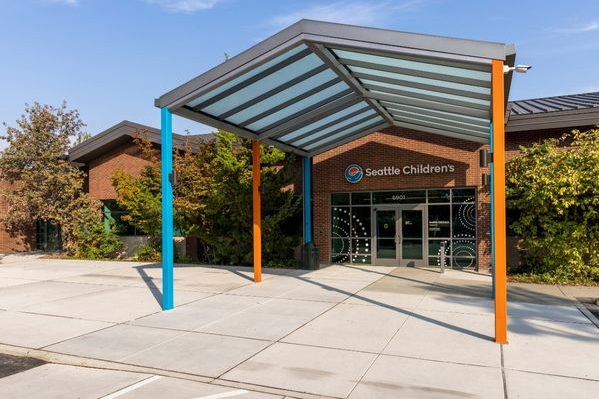Child & Adolescent Psychiatry Training Sites
The UW Child and Adolescent Psychiatry Program is currently based primarily in the new 45000 square foot Seattle Children’s Magnuson Building. This site, specially designed for youth with autism or behavioral health needs, serves as a hub for behavioral health care, outreach, training and research. The new space provides more treatment rooms and clinical spaces, where the team can facilitate clinical research. This allows families more opportunity to participate in research as well as get access to cutting-edge treatments. Our Magnuson location also includes better technology for observing trainees and for conducting livestreamed training for community providers, etc. This capability will also support our goal of improving access, because people can then get the care they need in their community by a provider we have trained, equity (care closer to home is more equitable), and patient-centered care (because they can get what they need from a community provider they already trust). We hope this new space will serve as a gathering space for families and kids with mental health care needs or autism. For more information about the Magnuson location, please visit: About Magnuson
Seattle Children’s Hospital (SCH) Sites
Seattle Children’s Hospital (SCH) is the primary training site, located in Seattle’s Laurelhurst neighborhood. It is a private, 250-bed, regional, not-for-profit hospital affiliated with the University of Washington. SCH has an international reputation for excellence in clinical care, research and teaching and serves as the primary tertiary facility for pediatric care in the Pacific Northwest. It is the largest provider of mental health services for children in the region. Patients are regularly referred from Washington, Alaska, Montana Wyoming, and Idaho. The Division of Child and Adolescent Psychiatry has a commitment to provide services for and conduct research in populations of under-served, acutely ill children and adolescents treated in the public sector. Child and Adolescent Psychiatry Residents complete rotations on the 41-bed inpatient unit at SCH, the Consultation/Liaison Service, and the hospital's Outpatient Psychiatry Clinic.
Psychiatry and Behavioral Medicine Unit (PBMU)
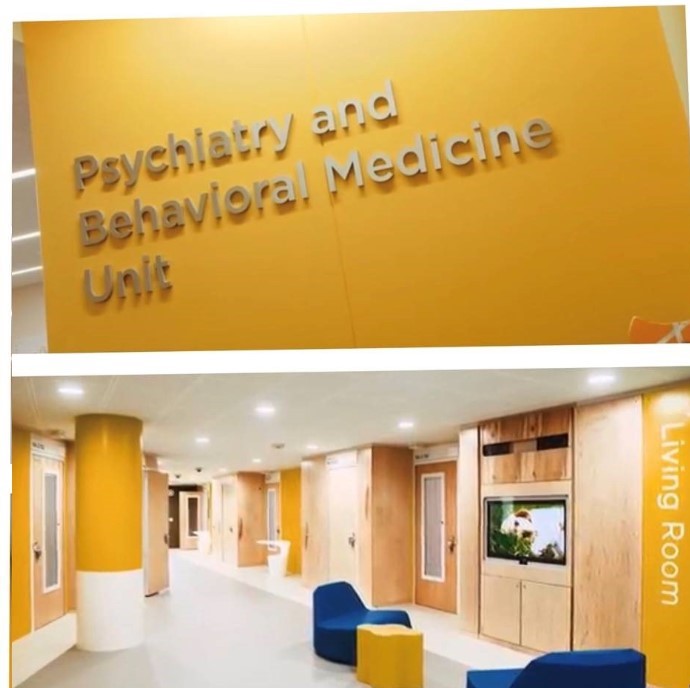
The Psychiatry and Behavioral Medicine Unit (PBMU), our inpatient psychiatry unit, is a comprehensive diagnostic and treatment center for children and adolescents from ages 3 to 17 with acute psychiatric disorders. The average stay is 7 days. Over 1500 patients are admitted each year with a wide range of diagnoses, including Attention Deficit/Hyperactivity Disorder, Disruptive Behavior Disorders, Depression, Bipolar Disorder, Developmental Disorders, Psychotic Disorders, Eating Disorders, and Autism Spectrum Disorder. In 2014 and 2015 the PBMU was expanded and remodeled to its current capacity of 41 single-patient rooms, a classroom, two dining areas, group rooms, and several other amenities for supporting the health and well-being of patients, families and staff. The PBMU provides the opportunity to work with a large interdisciplinary team which include attending psychiatrists, child psychiatry fellows, adult psychiatry residents, medical students, psychology residents, nurse practitioners, mental health therapists, nurses, teachers, case managers, therapists, and others. The unit has a strong focus on teaching, with regularly scheduled educational seminars such as case conferences and Multidisciplinary Didactics.
SCH Outpatient Psychiatry Clinic
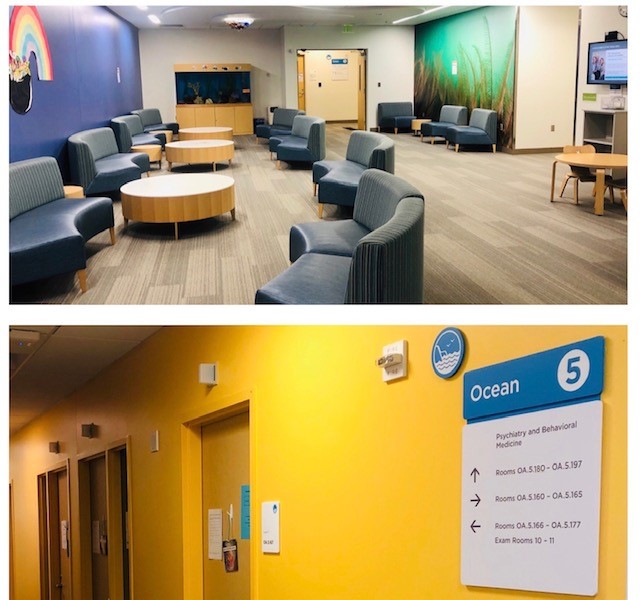
SCH offers outpatient services at the Magnuson clinic in North Seattle and the Odessa Brown Children's Center in central Seattle. The outpatient clinic at Magnuson is the primary outpatient training site and serves over 1600 children and families each year, totaling more than 12,000 visits. Services include diagnostic evaluations, routine and complicated psychopharmacological evaluation and management, cognitive-behavioral therapies, individual, family, and group therapy, patient and parent education groups, and school consultation. Children served are between the ages of 0-18 with diverse ethnic, economic, and social backgrounds, representing the entire spectrum of psychiatric diagnoses. Many of these children have comorbid developmental and medical disorders. Training of child psychiatrists occurs within the context of a community model implemented by a multidisciplinary team including psychologists, nurse practitioners, and crisis and support staff.
Psychiatry Consultation/Liaison Service and Emergency Services
The child psychiatry consult service is composed of a multidisciplinary team of psychologists and psychiatrists consulting to various medical services within SCH. The medical illnesses experienced by youth referred to the Psychiatry Consultation-Liaison Service are diverse, requiring flexibility and initiative to meet the requests of pediatrics teams. Common referrals include challenges in coping with chronic illnesses such as Crohn's Disease and diabetes, untoward reactions to medical care, such as delirium or prednisone-induced mood disorders, eating disorders, safety evaluations following suicidal behaviors or significant noncompliance, and consultation to our emergency room mental health staff. Psychiatric disturbances predominantly include mood and anxiety disorders associated with medical illness. Behavioral disturbances are also common as youth act out psychological disturbances through lack of adherence to their medical care, thereby challenging their providers in both the hospital and outpatient settings. Clinical work includes assessment, short-term psychotherapy, medication management, behavioral management, safety planning, and liaison with medical, nursing, and social work teams. Demographic variables follow SCH patient statistics. Proportions of patient referrals are roughly even by sex; 80% Caucasian; full spectrum of DSM-IV child and adolescent diagnostic categories in youth with medical illnesses and those with psychosomatic illnesses.
SCH Autism Center
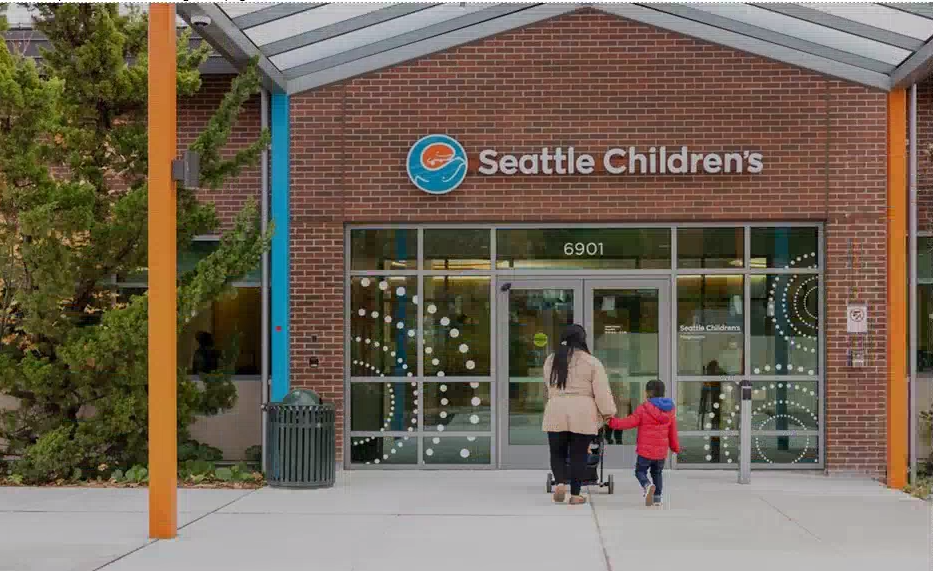
The Seattle Children's Autism Center (SCAC) is a multidisciplinary outpatient diagnostic and treatment clinic for children with autism spectrum disorder (ASD) and/or neurodevelopmental disorders, comprised of developmental pediatricians, child psychiatrists, neurologists, psychologists, nurse practitioners, behavioral therapists, and speech-language pathologists. It is one of our busiest clinical sites, serving over 4,000 unique children and families each year with approximately 20,000 visits per year. The Autism Center offers diagnostic testing for ASD using standardized assessment methods, treatment for co-morbid psychiatric conditions and disruptive behaviors using both psychopharmacological and behavioral approaches, treatment of co-morbid medical/neurological conditions, and individual and group based cognitive behavior therapy programs. Other specialized programs include Applied Behavior Analysis (ABA) based Early Intervention (EI) Program, Biobehavioral program, Pediatric Feeding Program, Research Units in Behavioral Intervention (RUBI) Program, as well as mood and anxiety disorders program (MAP). SCAC also offers various family classes including but not limited to adult transition planning classes along with a dedicated Family Resources and Nursing staff.
Residential Sites
Child Study and Treatment Center (CSTC)

The Child Study and Treatment Center is the only state psychiatric hospital for children and adolescents aged 5-17. We care for the most complex and challenged youth in Washington state. Located in Lakewood, 40 miles south of Seattle, we provide long-term, residential treatment to 65 individuals who stay for about 10-12 months. We also provide forensic evaluation and restoration of competency services. Our interdisciplinary team provides evidence-based interventions grounded in a therapeutic milieu and on-campus school, which include DBT, TF-CBT, group and family therapy, and recreational therapy.
Trainees spend 3 months at CSTC during the F1 year as an essential part of the interdisciplinary team. Unique opportunities include training in the above therapeutic modalities, complex psychopharmacology with an emphasis on deprescribing, forensic competency evaluation, collaborating with teachers, and navigating systems of care. Trainees gain experience with challenges that often include the consequences of developmental trauma, mood disorders, psychosis, substance use, ADHD, autism, intellectual and learning disabilities, sexually inappropriate behavior, aggressive behavior, and self-harm. Nowhere else in training will you have the option to participate in DBT soccer, PONGO poetry, and our annual camping trip!
Echo Glen
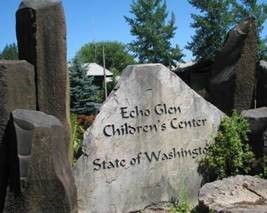
Echo Glen Children’s Center is a juvenile justice residential rehabilitation center for boys (ages 11-16) and girls (ages 11-21). Echo Glen is located in Snoqualmie Ridge, near exit 25 off Interstate 90. The census typically runs between 110 to 150 youth. Youth may present with complex histories and multiple risk factors. Common behavioral concerns include disruptive behavior disorders, attention-deficit/hyperactivity disorder, substance use disorders, anxiety disorders, post-traumatic stress symptoms and mood disorders. Echo Glen staff members are trained in cognitive-behavioral treatment techniques, including motivational enhancement, behavior analysis, behavior modification, and skills training based on aggression replacement training and dialectical behavior therapy. Child psychiatry and general psychiatry residents provide psychiatric evaluations, psychiatric medication management and psychotherapy. Additional training experiences include engaging youth and families, collaborating with health care and cottage staff, and addressing system of care issues. A year-long didactic covers general child psychiatry and effective juvenile justice practices.
Community Consultation Sites
Several community-based sites are available, in addition to the sites named. These include rural community mental health centers, Native American mental health agencies, ethnic minority mental health centers, therapeutic foster care programs, intensive community support programs, specialized daycare programs for preschoolers, and child abuse programs. Consultation opportunities related to state mental health legislation are also available.
School-Based Consultation
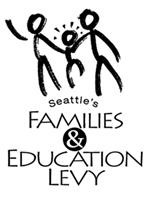
The School-Based Health Clinics/Reaching for Excellence Project collaborates with Public Health – Seattle & King County. During their second year of training, residents collaborate with psychology faculty members to provide once monthly in person or remote consultation to school-based health center clinicians located on site at more than 20 Seattle-area public elementary, middle, and high schools. In addition to consultation on specific cases, residents provide education to these providers regarding evidence-based medication and non-medication therapies. For residents who provide remote consultation, it is highly recommended that they arrange at least one on-site visit to a school during the course of their academic school-year long rotation.
Odessa Brown Children's Mental Health Clinic
OBCC is a community primary care clinic of Seattle Children's Hospital located in Seattle's Central District. Its namesake, Odessa Brown, was born in Arkansas in 1920. During the Great Depression, she moved to Chicago. While experiencing health problems, at a visit to a Chicago area hospital, she was turned away and denied care. Brown reportedly said to the staff, "I am black and poor, but I will leave in peace so that I can keep my dignity." Years later, Brown was raising her four children in Seattle when she became a community organizer and civil rights leader. One of her missions was to bring quality healthcare to children in the Central District. A year after her death, a new children's clinic opened in the Central District which the community named in her honor. OBCC is dedicated to providing culturally relevant, quality pediatric care, family advocacy, healthcare integration, mentoring and education to a culturally and socio-economically diverse population of youth. In addition to mental health services, the clinic also provides dental and nutritional services. Second-year residents who choose this rotation will spend one half-day per week at Odessa Brown for either 6 or 12 months. A majority of their patients will also being receiving primary care and mental health therapy at Odessa Brown creating many opportunities to interact and coordinate care with the other providers on the youth's care team. The mental health clinicians at OBCC have expertise in a number of areas, including Parent-Child Interaction Therapy, autism screening/evaluation, and school-based health care. Please visit their website for more information.
Harborview Medical Center (HMC)
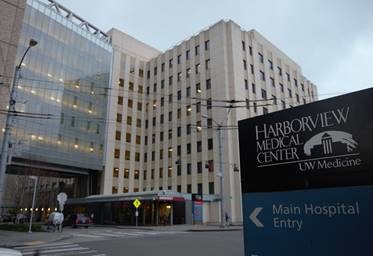
Harborview Medical Center’s Pediatric Clinic, with 8,400 visits per year, serves a population that includes indigents without third-party coverage, the non-English speaking poor, children in foster care, and many recent immigrants to the state of Washington. The current second-year 6-month child psychiatry rotation is a half-day a week, with a focus on consultation to the HMC Pediatric Clinic. Referrals for child psychiatry evaluations are made by the pediatric primary care attendings, ARNPs, and rotating pediatric residents with the assistance of care coordinators and social work. Following the initial evaluation, depending on the patient’s needs, the psychiatric resident will have the option to initiate treatment (acute stabilization and longer term), make recommendations to the primary care provider, or with the help of social work, provide the family with information and assistance regarding referral to other community services. As the psychiatry attending and the resident are physically embedded in the pediatric clinic, there is a high level of interdisciplinary consultation (i.e., curbsiding) with primary care providers, interpreters, nutritionists, and other specialty care providers. Rotating psychiatry residents are highly encouraged to present on topics of interest, as well, during Collaborative Care Rounds, which occur on a monthly basis. This is one of the most culturally diverse populations of the clinical sites of the Division of Child Psychiatry.
Asian Counseling and Referral Service (ACRS)
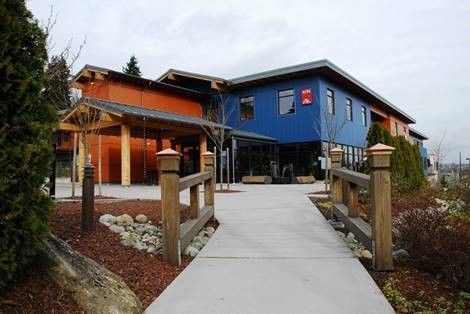
This historic agency, located in the International District of Seattle, is a nonprofit organization working for social justice and offering a broad array of behavioral health programs, human services and civic engagement activities for Asian Americans, Pacific Islanders, and other communities in King County and beyond. The Children, Youth and Families Program at ACRS strengthens AAPI families by engaging youth and helping them succeed and thrive in their communities. Their evidence-based, culturally competent approach is supported by bilingual and bicultural AAPI counselors and psychiatrists, who help youth grapple with the many challenges they may face as the children of immigrants and refugees, or as immigrants and refugees themselves. Fellows learn from the ACRS staff about the relevant cultural aspects of cases under discussion and the ACRS staff offer consultation to the resident around cultural issues. Fellows see patients for diagnostic evaluations, medication evaluations, and medication management sessions. Visit their website to learn more.
Child and Adolescent Latino Mental Health Assessment and Treatment Clinic (CALMA)
The CALMA clinic provides culturally responsive diagnostic evaluations and treatment for children and families who primarily speak Spanish. The clinic is led by attendings Cindy Ola Trevino, PhD and Michelle Dick, MD and all providers are certified to provide patient care in both English and Spanish. Services delivered at the CALMA include diagnostic evaluations, medication evaluations, short-term medication management, short-term individual psychotherapy and group treatment delivered in Spanish for disruptive behaviors, anxiety, and depression. Once an initial evaluation is completed, treatment recommendations are made, including group treatment at CALMA, referral to providers/resources in the community for further medication management or psychotherapy, or short-term medication management at CALMA before referring back to PCP or another community provider. Fellows may do a combination of individual appointments and/or co-leading groups. Passing the Spanish language certification test through Seattle Children's Interpreter Services is required. However, if interested in participating in groups only, certification for providing care in Spanish is still recommended, but can be approved on case-by-case basis with Dr. Dick. Visit their website to learn more.
